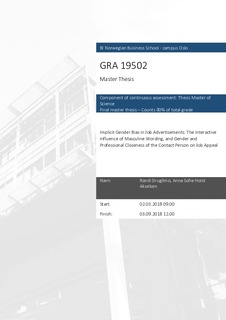| dc.contributor.author | Druglimo, Randi | |
| dc.contributor.author | Akselsen, Anna Sofie Holst | |
| dc.date.accessioned | 2019-01-11T12:18:23Z | |
| dc.date.available | 2019-01-11T12:18:23Z | |
| dc.date.issued | 2018 | |
| dc.identifier.uri | http://hdl.handle.net/11250/2580341 | |
| dc.description | Masteroppgave(MSc) in Master of Science in Leadership and Organizational Psychology - Handelshøyskolen BI, 2018 | nb_NO |
| dc.description.abstract | To understand the extent to which gendered wording exists in job advertisements in the
Norwegian context, and what the implications of using masculine wording in job advertisements for
male-dominated professions could be for the recruitment of female applicants, we have carried out
two studies. First, a pre-study was conducted to examine the existence of gendered wording in
Norwegian job advertisements for male-dominated professions. The archival analysis of 200 ads
showed that there is a minimal difference with a slightly higher percentage of masculine wording
than feminine wording (H1). In both Construction and Finance a higher percentage of masculine
language was found, whilst in the advertisements for positions within IT the number of feminine
words was higher. However, within Transport and Logistics the distribution of gendered words was
equal.
Second, using an experimental design and data from 174 college-level students, we found
that masculine wording in job advertisements for finance positions did not have a negative effect on
job appeal ratings from females (H2). When adding the gender of the contact person no difference
was found (H3). However, when looking at the interaction between the gender and professional
distance of the contact person and its effect on job appeal in the context of masculine wording, an
interesting effect was identified. In contrast to what we predicted, the findings suggest that female
job seekers are less likely to find the job advertisement appealing when the contact person is male
and professionally distant (H4).
This shows that in Norwegian job advertisements cues other than language may be
important for the recruitment of female applicants to male-dominated professions, and that further
research is needed in this area. Practical implications and suggestions for further research of these
findings are discussed.
Keywords: recruitment; gender bias; diversity; stereotypes; recruitment and selection | nb_NO |
| dc.language.iso | eng | nb_NO |
| dc.publisher | Handelshøyskolen BI | nb_NO |
| dc.subject | ledelse | nb_NO |
| dc.subject | organisasjonspsykologi | nb_NO |
| dc.subject | leadership | nb_NO |
| dc.subject | organizational psychology | nb_NO |
| dc.title | Implicit Gender Bias in Job Advertisements: The Interactive Influence of Masculine Wording, and Gender and Professional Closeness of the Contact Person on Job Appeal | nb_NO |
| dc.type | Master thesis | nb_NO |
